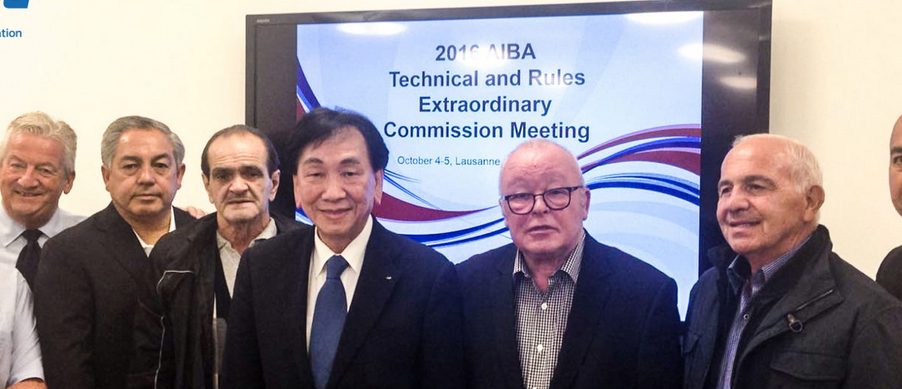AIBA Commissions meet in Lausanne to discuss reforms and road map for new Olympic cycle heading to Tokyo 2020 Games
Publish date:2016-10-13 Pageview: 1781

The AIBA Referees & Judges and Technical & Rules Commissions convened in Lausanne, Switzerland from 3-5 October, to reflect upon the Rio 2016 Olympic Games and plan affirmative actions to build on during the new Olympic cycle. Several crucial recommendations were made in the areas of referees and judges, the education of boxers and coaches, and improving the dialogue with National Federations, with the meetings marking a positive new horizon for AIBA and the boxing world.
“Rio 2016 was a watershed moment for AIBA,” said President Dr Ching-Kuo Wu. “Boxing was in the spotlight for positive reasons, but occasionally also for the wrong ones. As an organisation, we have pulled together and I am extremely happy with the work that has been done this week by highly experienced members of our commissions, whose expertise and council will allow AIBA and its community to develop further throughout this next Olympic cycle.”
Strong decisions taken regarding R&J management
While the majority of the boxing competition in Rio 2016 was received very positively thanks to the high level of boxing, the seamless integration of recent reforms such as headguard removal and the inclusion of non-AIBA pro boxers, a small number of decisions under debate indicated that further reforms in the AIBA R&J procedures were necessary.
Initial decisions were made on-site during Rio 2016 to ensure the smooth running of the rest of the competition. The results of a specific R&J investigation, currently underway, will allow AIBA to fully assess what action needs to be taken. In the mean time, it has been decided that all 36 R&Js that were used at the Olympic Games will not officiate at any AIBA event until the investigation reaches its conclusion, along with further immediate measures adopted by the commissions.
AIBA believes that the current 10-point must system, even though it’s subjective criteria sometimes causes misunderstandings and public debates, is the best scoring method for the sport because it takes into account the four key criteria essential to maintaining high level and entertaining boxing. What has been recommended by the Commission for future events is the opening up of all five of the judges scorecards to determine the winner of a bout.
The current R&J certification system was also discussed, with tangible proposals put forward to optimise and grow the R&J community over the next four years in accordance with the values and ethics set out by AIBA commission members. The current 5-star R&J programme will be disbanded and there will be greater empowerment and efficiency brought to the role of the R&J evaluators during competitions.
It was also recommended that the Draw of the R&J’s for each bout will now be automated via our supplier Swiss Timing, and no longer conducted by a three-person Draw Commission to instil greater transparency.
As a governing body, AIBA will always seek to evolve the sport but will continue to refute unsubstantiated claims that have tarnished the reputation of our sport. The experience and knowledge required to officiate a boxing match takes years to accumulate, and moving forward it is essential that the reputation of the R&J’s is restored. The judging system can never become a scapegoat for boxers and coaches who perform disappointingly in the ring and display inappropriate behaviour or comments to media. This will be even more closely monitored in the future and firm disciplinary action will be taken when necessary.
Education will be key to reforms’ success
Another key issue to arise from Rio was the need to better educate the different audiences concerning judging methods and the precautions taken by AIBA in order to preserve a level playing field for all boxers. From 2017, ahead of the Men’s World Championships in Germany, AIBA will be rolling out an extensive educational programme dedicated to this topic with the support of its National Federation members.
“Education will be a big part of the HeadsUp program in 2017. We want our fans, the media and of course the boxers to better understand our judging system, and we need to remind them of and explain our criteria more clearly and to open up dialogue that takes into account all feedback that can contribute to optimising the current system, but the decisions taken this week will already have contributed deeply to strengthening our stature,” concluded President Ching-Kuo Wu.
Following the Commissions’ recommendations, all relevant ratifications of current AIBA statutes and bye-laws to incorporate the decisions outlined above will be made at the Extraordinary Congress which will be held in December 2016.
News from AIBA.
















